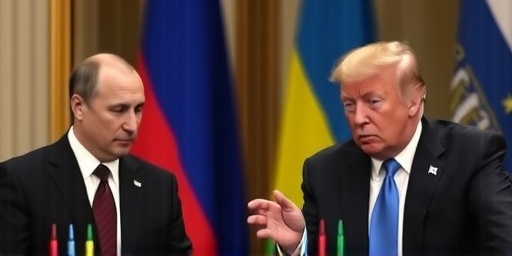In a sharp bipartisan rebuke that underscores deep divisions in U.S. foreign policy, a group of influential senators from both sides of the aisle has denounced President Donald Trump’s latest Russia-Ukraine peace plan as a dangerous form of appeasement. The proposal, unveiled amid escalating tensions in the region, has been criticized for potentially rewarding Russian aggression and eroding Ukraine’s hard-fought sovereignty, evoking painful historical parallels to pre-World War II concessions.
The condemnation came during a joint press conference on Capitol Hill, where senators including Democrat Jeanne Shaheen and Republican Lindsey Graham voiced their concerns. ‘This isn’t peace; it’s capitulation,’ Shaheen declared, emphasizing that the plan fails to address Russia’s unprovoked invasion that began in February 2022. Graham echoed the sentiment, warning that such a policy could embolden authoritarian regimes worldwide. This unified front from the Senate highlights a rare moment of consensus in an otherwise polarized political landscape, as lawmakers rally to protect U.S. commitments to NATO allies.
Senators Detail Flaws in Trump’s Russia-Ukraine Peace Plan
At the heart of the controversy is Trump’s peace plan, which proposes a ceasefire along current front lines in the Russia-Ukraine conflict, neutral status for Ukraine, and economic incentives for Moscow to withdraw troops gradually. Sources close to the administration describe it as a pragmatic approach to end the war that has claimed over 500,000 lives, according to Ukrainian government estimates, and displaced millions. However, senators argue that the concessions—such as lifting certain sanctions on Russia and recognizing de facto control over annexed territories like Crimea and parts of Donbas—amount to legitimizing Vladimir Putin’s territorial grabs.
Senator Marco Rubio (R-FL), a key voice in foreign policy circles, stated in a Senate floor speech, ‘By offering Russia a seat at the table without accountability for war crimes, we’re sending a message that aggression pays. This peace plan undermines everything we’ve stood for in supporting Ukraine’s right to self-determination.’ Rubio’s comments were part of a broader Senate resolution introduced yesterday, co-sponsored by 45 lawmakers, calling for a veto-proof majority to block any implementation of the proposal without congressional approval.
The plan’s details, leaked to major outlets like The New York Times, also include U.S. guarantees for Russian security concerns, such as limits on NATO expansion eastward. Critics in the Senate point out that this directly contradicts the 2023 NATO Summit commitments in Vilnius, where allies pledged unwavering support for Ukraine’s eventual membership. ‘Trump’s foreign policy here is shortsighted,’ said Senator Chris Coons (D-DE), adding that polls from Pew Research show 62% of Americans favor continued aid to Ukraine, reflecting public opposition to concessions.
Historical Shadows: Munich Agreement Comparisons Fuel Senate Backlash
The senators’ harshest critique draws direct lines to the 1938 Munich Agreement, where British and French leaders appeased Adolf Hitler by allowing the annexation of Czechoslovakia’s Sudetenland in exchange for a promise of peace. That policy, often cited as a catalyst for World War II, has become a potent symbol in diplomatic debates. Senator Mitt Romney (R-UT) invoked this history during the press conference, saying, ‘We all know how Munich ended— with greater conflict, not less. Trump’s Russia-Ukraine peace plan risks the same tragic mistake, sacrificing Ukraine’s sovereignty on the altar of short-term quiet.’
Historians and foreign policy experts have amplified these concerns. Dr. Fiona Hill, former National Security Council official, told CNN that the proposal mirrors Neville Chamberlain’s ‘peace in our time’ illusion. ‘Russia’s playbook hasn’t changed since the Soviet era,’ Hill noted. ‘Concessions only invite more demands.’ This historical lens is particularly resonant given the ongoing atrocities documented by the United Nations, including the bombing of civilian infrastructure in Kyiv and Kharkiv, which have led to over 10,000 civilian deaths as per UN reports.
In the Senate, this narrative has galvanized support. A bipartisan letter signed by 32 senators was sent to the White House yesterday, urging President Trump to reconsider. It highlights how similar appeasement in 2014, when Russia annexed Crimea with minimal repercussions, emboldened the full-scale invasion eight years later. ‘History teaches us that weakness invites aggression,’ the letter states, quoting from declassified intelligence reports showing Putin’s strategic calculations based on perceived U.S. hesitancy.
U.S. Foreign Policy Rift: Trump’s Plan Tests Senate Alliances
The backlash reveals a widening rift in U.S. foreign policy, particularly within the Republican Party, where Trump’s isolationist leanings clash with traditional hawkish stances on Russia. Since taking office, Trump’s administration has prioritized ‘America First’ diplomacy, reducing aid to Ukraine by 15% in the latest budget proposal, according to the Congressional Budget Office. This shift has prompted Senate leaders like Mitch McConnell to break ranks, with McConnell tweeting, ‘Supporting Ukraine is not optional; it’s essential to deterring Russian expansionism.’
Democrats, led by Senate Majority Leader Chuck Schumer, have seized on the issue to push for stricter oversight. Schumer announced plans for hearings next week, featuring testimony from Ukrainian President Volodymyr Zelenskyy via video link. ‘The Senate must act as a check on executive overreach in foreign policy,’ Schumer said in a statement. These hearings could feature expert panels discussing the economic fallout, including how the peace plan might disrupt global energy markets, given Russia’s control over 40% of Europe’s natural gas pre-war.
Public reaction mirrors the Senate’s divide. A Gallup poll conducted last week shows 55% of Republicans support Trump’s approach, viewing it as a way to avoid ‘endless wars,’ while 78% of Democrats and 65% of independents oppose it, fearing it weakens U.S. global standing. Advocacy groups like the Atlantic Council have mobilized, launching a campaign with over 100,000 signatures urging the Senate to sustain military aid packages totaling $61 billion approved in 2024.
Internationally, the proposal has drawn mixed responses. NATO Secretary General Jens Stoltenberg expressed ‘profound concerns’ in a Brussels briefing, stating that any peace deal must include Russian withdrawal from all occupied territories. European leaders, including UK Prime Minister Keir Starmer, have pledged additional £2.5 billion in aid to Ukraine, signaling a transatlantic pushback against unilateral U.S. moves.
Path Forward: Senate Pushes for Robust Ukraine Support Amid Peace Plan Debate
As the dust settles from the initial condemnations, the Senate is gearing up for decisive action to counter Trump’s Russia-Ukraine peace plan. Lawmakers are drafting legislation that would require Senate ratification for any major foreign policy shifts involving NATO allies, potentially setting a precedent for future administrations. This includes bolstering sanctions on Russian oligarchs and expanding the Magnitsky Act to target enablers of the invasion.
Looking ahead, the implications for U.S. foreign policy are profound. If the Senate’s bipartisan coalition holds, it could lead to increased military assistance, including advanced F-16 jets and ATACMS missiles already in the pipeline. Ukrainian officials, speaking anonymously, express cautious optimism, noting that Senate pressure has historically unlocked stalled aid. Zelenskyy is expected to address a joint session of Congress next month, a move designed to rally support and highlight the human cost of the war.
Economically, rejecting the plan could stabilize global markets; the World Bank estimates that a prolonged conflict under appeasement terms might add $1 trillion to worldwide inflation pressures. Meanwhile, Trump’s team defends the proposal as a ‘bold negotiation tactic,’ with Secretary of State Mike Pompeo scheduled to brief the Senate Foreign Relations Committee tomorrow. Yet, with 60 senators now publicly opposed, the path to implementation appears fraught.
Ultimately, this episode tests the resilience of American leadership in the Russia-Ukraine theater. As one anonymous Senate aide put it, ‘The stakes aren’t just about borders; they’re about the rules-based order that has kept the peace since 1945.’ With midterm elections looming, the debate will undoubtedly shape voter perceptions of foreign policy priorities, ensuring that Ukraine remains a flashpoint in Washington for months to come.








